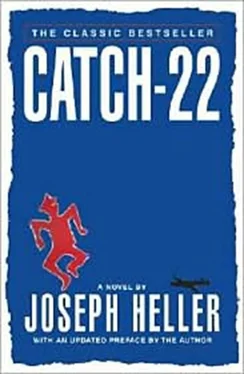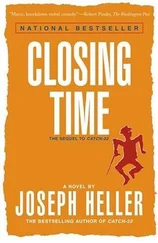“Where’ve you been?” he demanded rudely and disinterestedly, without looking up.
The chaplain colored and turned away evasively. “I went for a walk through the woods.”
“All right,” Corporal Whitcomb snapped. “Don’t take me into your confidence. But just wait and see what happens to my morale.” He bit into the chaplain’s candy bar hungrily and continued with a full mouth. “You had a visitor while you were gone. Major Major.”
The chaplain spun around with surprise and cried: “Major Major? Major Major was here? ”
“That’s who we’re talking about, isn’t it?”
“Where did he go?”
“He jumped down into that railroad ditch and took off like a frightened rabbit.” Corporal Whitcomb snickered. “What a jerk!”
“Did he say what he wanted?”
“He said he needed your help in a matter of great importance.”
The chaplain was astounded. “Major Major said that ?”
“He didn’t say that,” Corporal Whitcomb corrected with withering precision. “He wrote it down in a sealed personal letter he left on your desk.”
The chaplain glanced at the bridge table that served as his desk and saw only the abominable orange-red pear-shaped plum tomato he had obtained that same morning from Colonel Cathcart, still lying on its side where he had forgotten it like an indestructible and incamadine symbol of his own ineptitude. “Where is the letter?”
“I threw it away as soon as I tore it open and read it.” Corporal Whitcomb slammed the Bible shut and jumped up. “What’s the matter? Won’t you take my word for it?” He walked out. He walked right back in and almost collided with the chaplain, who was rushing out behind him on his way back to Major Major. “You don’t know how to delegate responsibility,” Corporal Whitcomb informed him sullenly. “That’s another one of the things that’s wrong with you.”
The chaplain nodded penitently and hurried past, unable to make himself take the time to apologize. He could feel the skillful hand of fate motivating him imperatively. Twice that day already, he realized now, Major Major had come racing toward him inside the ditch; and twice that day the chaplain had stupidly postponed the destined meeting by bolting into the forest. He seethed with self-recrimination as he hastened back as rapidly as he could stride along the splintered, irregularly spaced railroad ties. Bits of grit and gravel inside his shoes and socks were grinding the tops of his toes raw. His pale, laboring face was screwed up unconsciously into a grimace of acute discomfort. The early August afternoon was growing hotter and more humid. It was almost a mile from his tent to Yossarian’s squadron. The chaplain’s summer-tan shirt was soaking with perspiration by the time he arrived there and rushed breathlessly back inside the orderly room tent, where he was halted peremptorily by the same treacherous, soft-spoken staff sergeant with round eyeglasses and gaunt cheeks, who requested him to remain outside because Major Major was inside and told him he would not be allowed inside until Major Major went out. The chaplain looked at him in an uncomprehending daze. Why did the sergeant hate him? he wondered. His lips were white and trembling. He was aching with thirst. What was the matter with people? Wasn’t there tragedy enough? The sergeant put his hand out and held the chaplain steady.
“I’m sorry, sir,” he said regretfully in a low, courteous, melancholy voice. “But those are Major Major’s orders. He never wants to see anyone.”
“He wants to see me,” the chaplain pleaded. “He came to my tent to see me while I was here before.”
“Major Major did that?” the sergeant asked.
“Yes, he did. Please go in and ask him.”
“I’m afraid I can’t go in, sir. He never wants to see me either. Perhaps if you left a note.”
“I don’t want to leave a note. Doesn’t he ever make an exception?”
“Only in extreme circumstances. The last time he left his tent was to attend the funeral of one of the enlisted men. The last time he saw anyone in his office was a time he was forced to. A bombardier named Yossarian forced-“
“Yossarian?” The chaplain lit up with excitement at this new coincidence. Was this another miracle in the making? “But that’s exactly whom I want to speak to him about! Did they talk about the number of missions Yossarian has to fly?”
“Yes, sir, that’s exactly what they did talk about. Captain Yossarian had flown fifty-one missions, and he appealed to Major Major to ground him so that he wouldn’t have to fly four more. Colonel Cathcart wanted only fifty-five missions then.”
“And what did Major Major say?”
“Major Major told him there was nothing he could do.”
The chaplain’s face fell. “Major Major said that?”
“Yes, sir. In fact, he advised Yossarian to go see you for help. Are you certain you wouldn’t like to leave a note, sir? I have a pencil and paper right here.”
The chaplain shook his head, chewing his clotted dry lower lip forlornly, and walked out. It was still so early in the day, and so much had already happened. The air was cooler in the forest. His throat was parched and sore. He walked slowly and asked himself ruefully what new misfortune could possibly befall him a moment before the mad hermit in the woods leaped out at him without warning from behind a mulberry bush. The chaplain screamed at the top of his voice.
The tall, cadaverous stranger fell back in fright at the chaplain’s cry and shrieked, “Don’t hurt me!”
“Who are you?” the chaplain shouted.
“Please don’t hurt me!” the man shouted back.
“I’m the chaplain!”
“Then why do you want to hurt me?”
“I don’t want to hurt you!” the chaplain insisted with a rising hint of exasperation, even though he was still rooted to the spot. “Just tell me who you are and what you want from me.”
“I just want to find out if Chief White Halfoat died of pneumonia yet,” the man shouted back. “That’s all I want. I live here. My name is Flume. I belong to the squadron, but I live here in the woods. You can ask anyone.”
The chaplain’s composure began trickling back as he studied the queer, cringing figure intently. A pair of captain’s bars ulcerated with rust hung on the man’s ragged shirt collar. He had a hairy, tar-black mole on the underside of one nostril and a heavy rough mustache the color of poplar bark.
“Why do you live in the woods if you belong to the squadron?” the chaplain inquired curiously.
“I have to live in the woods,” the captain replied crabbily, as though the chaplain ought to know. He straightened slowly, still watching the chaplain guardedly although he towered above him by more than a full head.
“Don’t you hear everybody talking about me? Chief White Halfoat swore he was going to cut my throat some night when I was fast asleep, and I don’t dare lie down in the squadron while he’s still alive.”
The chaplain listened to the implausible explanation distrustfully. “But that’s incredible,” he replied. “That would be premeditated murder. Why didn’t you report the incident to Major Major?”
“I did report the incident to Major Major,” said the captain sadly, “and Major Major said he would cut my throat if I ever spoke to him again.” The man studied the chaplain fearfully. “Are you going to cut my throat, too?”
“Oh, no, no, no,” the chaplain assured him. “Of course not. Do you really live in the forest?”
The captain nodded, and the chaplain gazed at his porous gray pallor of fatigue and malnutrition with a mixture of pity and esteem. The man’s body was a bony shell inside rumpled clothing that hung on him like a disorderly collection of sacks. Wisps of dried grass were glued all over him; he needed a haircut badly. There were great, dark circles under his eyes. The chaplain was moved almost to tears by the harassed, bedraggled picture the captain presented, and he filled with deference and compassion at the thought of the many severe rigors the poor man had to endure daily. In a voice hushed with humility, he said,
Читать дальше












